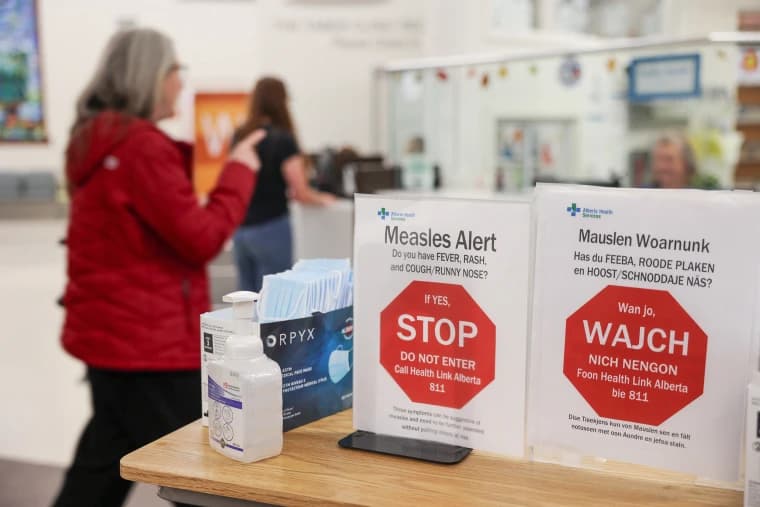We're loading the full news article for you. This includes the article content, images, author information, and related articles.
The loss of Canada's three-decade measles elimination status due to falling vaccination rates offers a stark warning for Kenya, which is simultaneously battling its own outbreaks and struggling to meet immunisation targets amid funding gaps.

GLOBAL - Canada has officially lost its measles elimination status after failing to control outbreaks for over a year, the Pan American Health Organization (PAHO) announced on Monday, 10 November 2025. This development, which also strips the Americas of its regional elimination status, serves as a critical global health warning, with significant implications for nations like Kenya that are grappling with their own resurgence of the highly contagious virus.
The declaration by PAHO, the World Health Organization's (WHO) regional office, follows 12 consecutive months of sustained measles transmission within Canada. Since the outbreak began in October 2024, the country has recorded over 5,100 cases and two deaths. Health officials attribute the resurgence to declining vaccination coverage, which has fallen below the 95% threshold required for herd immunity. According to PAHO data, only 79% of Canada's population had received two doses of the measles vaccine in 2024, a significant drop from 87% in 2019.
"This loss represents a setback, but it is also reversible," stated Dr. Jarbas Barbosa, PAHO's director, at a news conference on Monday, 11 November 2025, East Africa Time. The Public Health Agency of Canada (PHAC) acknowledged the situation, confirming it is collaborating with PAHO and provincial authorities to bolster vaccination rates and surveillance. To regain its status, Canada must demonstrate an interruption of the outbreak strain's transmission for at least 12 months.
The situation in North America is precarious, as the United States is also at risk of losing its measles elimination status, which it has held since 2000. As of early November 2025, the U.S. Centers for Disease Control and Prevention (CDC) had reported 1,681 confirmed measles cases across 42 jurisdictions this year, the highest number in over three decades. Experts warn that if ongoing outbreaks in states like South Carolina, Arizona, and Utah are linked and continue into January 2026, the U.S. will likely face the same designation as Canada.
The developments in North America resonate deeply in Kenya, which is fighting its own battle against measles amid significant challenges. Between January 2024 and February 2025, Kenya's Ministry of Health reported 2,949 measles cases and 18 deaths across 18 counties. This surge is largely attributed to gaps in vaccination coverage, particularly the low uptake of the second dose of the Measles-Rubella (MR) vaccine.
According to a July 2025 report from the WHO and UNICEF, Kenya's national coverage for the first measles dose (MCV1) was 91% by the end of 2024, but only 76% for the second dose (MCV2), well below the 95% target needed for community protection. This gap leaves a significant portion of children vulnerable. The situation is exacerbated by funding shortfalls for immunisation programs. A Ministry of Health analysis revealed that of the KES 11.6 billion required annually for immunisations, the government covers only KES 2 billion, creating a critical dependency on international partners like Gavi, the Vaccine Alliance.
Certain regions in Kenya are particularly vulnerable. Turkana County, which borders conflict-affected countries and hosts a large refugee population, reported 1,444 cases and nearly a dozen deaths by May 2025, with only 29% of children in the county fully vaccinated. These cross-border dynamics and movements of unvaccinated populations present an ongoing risk of virus importation and spread.
The re-establishment of endemic measles in a high-income country like Canada underscores the global threat posed by vaccine hesitancy and misinformation, phenomena that have gained traction since the COVID-19 pandemic. For Kenya, the global resurgence highlights the urgent need to address domestic challenges. In response to its outbreaks, the Kenyan government, with support from WHO and UNICEF, launched a 10-day nationwide vaccination campaign in July 2025, targeting children for both measles-rubella and typhoid.
Health experts emphasize that measles is one of the most contagious viruses known and can lead to severe complications, including blindness, encephalitis, and death, particularly in young children. The loss of elimination status in the Americas is a stark reminder that progress against vaccine-preventable diseases is fragile. As Dr. Barbosa noted, until measles is eliminated worldwide, all regions remain at risk of reintroduction and spread among under-vaccinated populations. For Kenya, this global context amplifies the importance of strengthening its own health systems, securing sustainable funding for immunisation, and rebuilding public trust in vaccines to protect its population from a preventable threat.
Keep the conversation in one place—threads here stay linked to the story and in the forums.
Sign in to start a discussion
Start a conversation about this story and keep it linked here.
Other hot threads
E-sports and Gaming Community in Kenya
Active 9 months ago
The Role of Technology in Modern Agriculture (AgriTech)
Active 9 months ago
Popular Recreational Activities Across Counties
Active 9 months ago
Investing in Youth Sports Development Programs
Active 9 months ago